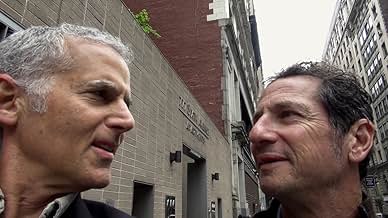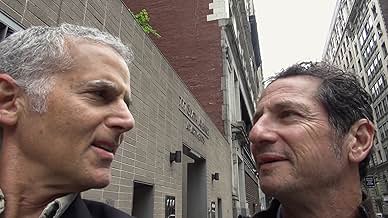ÉVALUATION IMDb
5,4/10
1,3 k
MA NOTE
Ajouter une intrigue dans votre langueA mind-boggling coincidence leads the filmmaker to track down his fifth grade class and fifth grade teacher to examine their memory of and complicity in a bullying incident 50 years ago.A mind-boggling coincidence leads the filmmaker to track down his fifth grade class and fifth grade teacher to examine their memory of and complicity in a bullying incident 50 years ago.A mind-boggling coincidence leads the filmmaker to track down his fifth grade class and fifth grade teacher to examine their memory of and complicity in a bullying incident 50 years ago.
- Nommé pour 1 oscar
- 3 victoires et 7 nominations au total
Photos
Histoire
Le saviez-vous
- Citations
Jay Rosenblatt: For me the memory was vague; all I knew for sure is that it happened and I participated.
- Générique farfeluThe very end of the credits features more stop motion animation of the Dick photo on the playground as it quickly "walks" off-screen.
- ConnexionsReferences The Smell of Burning Ants (1994)
Commentaire en vedette
I'll start off to say at the outset that I was bullied relentlessly in school. The first observation I have is that I turned out ok, and I have a good life. I've been successful. The second observation I have is that, despite my adaptation, the bullying I experienced affects me negatively to this day. Both of these are true. What's more, I've talked to some of my childhood bullies now that we're 30+ years away from the incidents, and I've enjoyed getting their perspective on these things. It also helps, weirdly, that some of them have apologized.
So, that's my perspective, and I feel it's a complete perspective because it involves everyone who was actually involved, and it processes the emotions we all feel for this. I feel that in a lot of ways I've been able to process the situation I was in, and I've also been able to help others process their involvement, by hearing their apologies in most cases, and also forgiving. I mean, that isn't what I set out to do, but it's a healing process and for me it works.
This documentary doesn't do that. For some reason, it sticks strictly to the perspective of the bullies, interviewing them at various points, and so along with the documentarian, we get the perspective of the classmates involved in a vicious bullying incident to which most of them were involved.
The documentarian decided to pass on including the bullied kid. His reasoning was shallow at best -- he seems not to have wanted to portray the victim of bullying as having been able to get past his experiences and to become successful. There are so many things wrong with that approach, but the first is that the documentarian is seeking to portray a preferred reality rather than the reality as it exists outside of his head -- that reality being his preference not to "minimize" his bullying by showing a person who came out of it able to function and function well. Like it or not, that IS the reality in this case, and it shouldn't be dodged.
The second reason is related to the first, in that, by excluding the victim for that reason, he has missed possibly seeing the intricacies that go beyond simply how successful the man was in life. Being someone who is also successful in life, I can tell you that doesn't mean that the feelings were not necessary to process, and the contact with past bullies has helped me in ways even I didn't expect. That would have been the way to approach this -- but the documentarian took the easy way out. Imagine going all the way to Florida to visit the elderly teacher to discuss the incident in question, an incident she doesn't even remember, but not including the victim of the bullying. It's just a weird step to take, and the reasoning used simply sounds, feels, and tastes like a copout.
I spend most of my time watching documentaries. It's really one of the few types of television I watch. I've noticed that documentaries more and more attempt to portray from facts to a desired conclusion rather than present the facts for a clear conclusion, and editing is the chief tool in making this happen. So I realize this is technically what most documentaries have become, but I think there's a fine line somewhere that this one crossed that others have not. It crossed from documentary into docudrama without actually saying so, and the documentarian crossed from documentarian to the broader category of filmmaker, or even entertainer. Unfortunately, I cannot really recommend the result.
So, that's my perspective, and I feel it's a complete perspective because it involves everyone who was actually involved, and it processes the emotions we all feel for this. I feel that in a lot of ways I've been able to process the situation I was in, and I've also been able to help others process their involvement, by hearing their apologies in most cases, and also forgiving. I mean, that isn't what I set out to do, but it's a healing process and for me it works.
This documentary doesn't do that. For some reason, it sticks strictly to the perspective of the bullies, interviewing them at various points, and so along with the documentarian, we get the perspective of the classmates involved in a vicious bullying incident to which most of them were involved.
The documentarian decided to pass on including the bullied kid. His reasoning was shallow at best -- he seems not to have wanted to portray the victim of bullying as having been able to get past his experiences and to become successful. There are so many things wrong with that approach, but the first is that the documentarian is seeking to portray a preferred reality rather than the reality as it exists outside of his head -- that reality being his preference not to "minimize" his bullying by showing a person who came out of it able to function and function well. Like it or not, that IS the reality in this case, and it shouldn't be dodged.
The second reason is related to the first, in that, by excluding the victim for that reason, he has missed possibly seeing the intricacies that go beyond simply how successful the man was in life. Being someone who is also successful in life, I can tell you that doesn't mean that the feelings were not necessary to process, and the contact with past bullies has helped me in ways even I didn't expect. That would have been the way to approach this -- but the documentarian took the easy way out. Imagine going all the way to Florida to visit the elderly teacher to discuss the incident in question, an incident she doesn't even remember, but not including the victim of the bullying. It's just a weird step to take, and the reasoning used simply sounds, feels, and tastes like a copout.
I spend most of my time watching documentaries. It's really one of the few types of television I watch. I've noticed that documentaries more and more attempt to portray from facts to a desired conclusion rather than present the facts for a clear conclusion, and editing is the chief tool in making this happen. So I realize this is technically what most documentaries have become, but I think there's a fine line somewhere that this one crossed that others have not. It crossed from documentary into docudrama without actually saying so, and the documentarian crossed from documentarian to the broader category of filmmaker, or even entertainer. Unfortunately, I cannot really recommend the result.
- AtlasShruggd
- 1 mai 2022
- Lien permanent
Meilleurs choix
Connectez-vous pour évaluer et surveiller les recommandations personnalisées
Détails
- Durée36 minutes
- Couleur
- Rapport de forme
- 16 : 9
Contribuer à cette page
Suggérer une modification ou ajouter du contenu manquant

Lacune principale
By what name was When We Were Bullies (2021) officially released in Canada in English?
Répondre
















